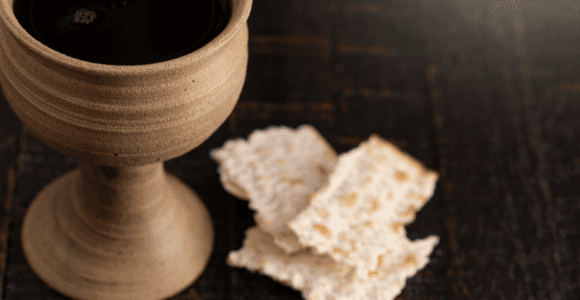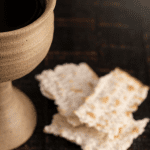Welcome readers! Please subscribe through the button on the right.

Our reading this week is from the gospel of Luke:
When the hour came, Jesus and his apostles reclined at the table. And he said to them, “I have eagerly desired to eat this Passover with you before I suffer. For I tell you, I will not eat it again until it finds fulfillment in the kingdom of God.” After taking the cup, he gave thanks and said, “Take this and divide it among you. For I tell you I will not drink again from the fruit of the vine until the kingdom of God comes.” And he took bread, gave thanks and broke it, and gave it to them, saying, “This is my body given for you; do this in remembrance of me.” In the same way, after the supper he took the cup, saying, “This cup is the new covenant in my blood, which is poured out for you. (Luke 22:14-20)
Next week is Holy Week leading up to Easter for many in Western Christianity. This time of year always amplifies several passages from the passion liturgy that are important for Jesus followers who care about justice to interpret in life-giving ways. So it was difficult for me to settle on which passage to write on this week.
I love the story of Jesus’ protest and demonstration in the temple courtyard against the economic exploitation that was taking place there. I believe both his protest and his burden for those being harmed by systemic injustice have much to teach us. I love the story of Jesus humbly washing his disciples’ feet, which Christians now celebrate each year on Maundy Thursday. I also believe it’s important to interpret the holy week narrative beyond death and dying, even though at the end of the week Jesus is the victim of state violence in response to his protest, calls for change, and growing popularity with the exploited masses in his society. It’s more life-giving to interpret Holy Week as a story of how life overturns death and death-dealing, how everything accomplished through the execution/death of Jesus was undone, reversed, and overcome through the resurrection. The cross was not Jesus’ saving act, but the state’s attempted interruption and halting of Jesus’ saving life-ministry. The resurrection reversed and undid the state’s violence, and Jesus’ life-saving ministry lived on in the actions of his followers.
So as we begin this holy week, I’ve chosen to address Luke’s version of Jesus’ last shared meal with his disciples. I’ll begin with an important point from Delores Williams’ womanist theology classic book, Sisters in the Wilderness.
On page 131, Williams reminds us that “The cross is a reminder of how humans have tried throughout history to destroy visions of righting relationships that involve the transformation of tradition and transformation of social relations and arrangements sanctioned by the status quo.” She goes on to point her readers to the resurrection and the kingdom of God theme in Jesus’ life ministry as the salvific conduit that teaches humankind how to “live peacefully, productively and abundantly in relationship.” She lists Jesus’ beatitudes, parables, moral directions, and reprimands. She reminds us of Jesus’ healing ministry of “touch and being touched,” and how Jesus ministry was militant, too, expelling evil forces that harm people including during his temple protest.
This is how she characterizes Jesus’ saving life: a life grounded in the power of faith “in the work of healing,” compassion and love. She demonstrates with multiple examples how Jesus conquered sin in life, not in death. Considering the persistence of evil and oppression (and sin) still centuries still after the life of Jesus in our world, she wonders whether or not most people can believe that Jesus’ death on the cross overcame evil and sin. I agree with her assessment that it seems “more intelligent and more scriptural to understand that redemption had to do with God, through Jesus, giving humankind new vision to see the resources for positive, abundant relational life” (p. 131).
A major theme in William’ work is the surrogacy of black women and how various atonement theories and ways of interpreting the cross substitutionally have historically supported that surrogacy rather than subverted it.
She concludes:
“Humankind is, then, redeemed through Jesus’ ministerial vision of life and not through his death. There is nothing divine in the blood of the cross. God does not intend black women’s surrogacy experience. Neither can Christian faith affirm such an idea. Jesus did not come to be a surrogate. Jesus came for life, to show humans a perfect vision of ministerial relation that humans had very little knowledge of. As Christians, black women cannot forget the cross, but neither can they glorify it. To do so is to glorify suffering and to render their exploitation sacred. To do so is to glorify the sin of defilement. (Sisters in the Wilderness: The Challenge of Womanist GodTalk, p. 132)
And this leads me to the tension in this week’s passage.
(Read Part 2)














